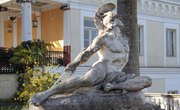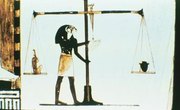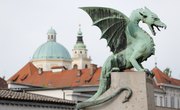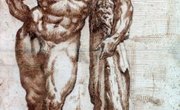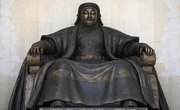The Greek hero Odysseus is best known for his role in winning the Trojan War and for his long voyage home. Homer sometimes used the term "hero" to refer to any gifted member of the aristocracy, but Odysseus stood apart from his contemporaries in his wit, which equaled that of Zeus. Odysseus approached each challenge with creativity and humor, enabling him to circumvent death and return home.
A Vow of Loyalty
Odysseus inherited his position as King of Ithaca from his father, Laertes. As one of the failed suitors of the beautiful Helen, Odysseus swore his allegiance to her husband, King Menelaus of Sparta, promising to defend him from any slight to his character on account of his beautiful wife. Having failed to win Helen's hand, Odysseus married the faithful Penelope, who bore their son, Telemachus. Shortly thereafter, the Trojans kidnapped Helen, and the Spartans called upon Odysseus to fulfill the terms of his vow.
Fate Unaverted
Odysseus heard a prophecy about his fate of being lost at sea and was reluctant to tempt fate by entering the Trojan War. Thus, when Agamemnon's messenger Palamedes called upon Odysseus to fulfill the vow and help King Menelaus retrieve Helen, Odysseus feigned madness. He sowed a field with salt, but when Palamedes placed Telemachus, in front of the plough, Odysseus turned, unwilling to sacrifice his son. He joined the Greeks, comporting himself bravely and wisely as a ship captain and as a warrior.
Counselor of War
Due to his rank and cunning, Odysseus often worked alongside King Agamemnon to form war strategies. He also played a major role in controlling Achilles' rage and impulsiveness, often convincing the warrior to either to remain at war or to refrain from jumping into combat. To gain an edge toward the end of the war, Odysseus devised the idea of the Trojan Horse. The Greeks feigned surrender, offering a giant wooden horse as a gift to Troy. When the Trojans took the horse within their city, the Greeks leaped out, fully armed, and won the battle easily.
The Storms of Fate
Victorious in war, Odysseus led his ships home, only to be thwarted by a storm. He and his crew invaded the city of the Cicones, kidnapping their wives and stealing their possessions. The Cicones retaliated, killing several of Odysseus' men and pushing the rest off the island. They encountered another storm, then found themselves on the island of Lotus Eaters. Several of his men wished for the oblivion offered by the lotus flowers, as the blossoms made them forget their home and troubles. Odysseus forced them back on his ships and continued the journey.
Igniting the Sea God's Wrath
The Greeks viewed the ocean as much as a mythological entity as a geographical one, so though Odysseus' earlier encounters were strictly human, he soon found himself beset by gods and monsters alike. After pulling his men away from the Lotus Eaters, he landed on another island, where the Cyclops Polyphemus took him and his men hostage. Odysseus said his name was "No-man" and blinded the monster, disguising himself and his men as sheep to escape. However, Odysseus revealed his identity when Polyphemus pursued them. Polyphemus alerted his father, the sea god Poseidon, who tormented Odysseus for the rest of his travels.
Wind and Swine
The keeper of the winds, Aeolus, gave Odysseus a bag of wind to expedite his journey, but the winds blew them off-course. When they returned to Aeolus, he refused to help them again. Odysseus and his men narrowly escaped death at the hands of ogres before encountering the sorceress Circe, who turned his men into pigs. The god Hermes appeared and gave Odysseus a root that made him immune to Circe's magic. Odysseus convinced Circe not to hurt him and to reverse the spell on his men, sleeping and dining with her to seal the pact. He remained for a year, after which Circe advised him to seek the counsel of the prophet Teiresias in the underworld.
Song and Storm
Teiresias told Odysseus that he would lose most of his men on the journey and that he might survive on the condition that he refrain from harming the cattle of Helios. Odysseus continued on, telling his men to plug their ears to avoid the deadly song of the Sirens, though he tied himself to the ship to listen himself. When they reached the island of the cattle, Odysseus fell asleep and his men killed the cattle. The gods sent another storm, which killed them men and destroyed the ship. Odysseus survived by clinging to a few planks of wood, narrowly avoiding death by the monsters Scylla and Charybdis.
The Homecoming
Odysseus landed on the island of the nymph Calypso, remaining there for eight years before Athena, goddess of wisdom, sent Hermes to demand his release. She helped Odysseus ingratiate himself to the Phraceans, whose ships bore him home to Ithaca. Once there, he vanquished the suitors who had sought the hand of his wife, Penelope, in his long absence. Penelope was unsure of his identity, but after he described their bed to her, which was made from a tree still rooted to the ground, she accepted welcomed her husband home.
Related Articles
References
Writer Bio
Since 2003, Momi Awana's writing has been featured in "The Hawaii Independent," "Tradewinds" and "Eternal Portraits." She served as a communications specialist at the Hawaii State Legislature and currently teaches writing classes at her library. Awana holds a Master of Arts in English from University of Hawaii, Mānoa.





